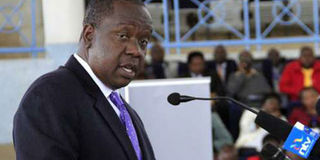Part-time lecturers on way out in bid to boost quality

Education Cabinet Secretary Fred Matian'gi delivers his speech during the biennial conference on the state of higher education in Kenya, at Kenyatta University on August 22, 2016. The Commission for University Education has announced that part-time lecturers will be phased out. PHOTO | DIANA NGILA | NATION MEDIA GROUP
What you need to know:
- Prof Nangulu said the commission is determined to phase out part-time lecturers, saying most of them are giving substandard services to students.
- The Commission for University Education's report indicates that for the past one year, close to 6,000 students enrolled for PhDs, but only 369 graduated, which translates to 6.2 per cent.
Part-time lecturers will soon be locked out of universities as the higher education regulator moves in to ensure that those teaching in the institutions meet minimum requirements.
Anne Nangulu, the Commission for University Education (CUE) deputy CEO in charge of quality, audit and standards, said instead universities will be required to share available lecturers.
“We are encouraging intra-mobility of lecturers, which means that universities can share available lecturers,” said Prof Nangulu.
She said the commission is determined to phase out part-time lecturers, saying most of them are giving substandard services to students.
“Most of these part-time lecturers cannot recommend students since most of them do not know the students as they spent less time with them,” she told the Nation during the just concluded conference on university education.
CUE has directed that by 2018 all university lecturers must be holders of doctoral degrees.
Statistics indicate that there are 23 accredited public universities, 12 public university constituent colleges, 17 chartered private universities, five private university constituent colleges and 14 private universities with Letters of Interim Authority.
The body's report indicates that for the past one year, close to 6,000 students enrolled for PhDs, but only 369 graduated, which translates to 6.2 per cent.
It also indicates that the country has less than 10,000 PhD holders, and requires 1,000 PhDs per year in order to narrow the student-to-lecturer ratio.
NEW DEVELOPMENTS
At the same time, seven university colleges and a private college are set to become fully fledged universities.
The certification will be presided over by President Uhuru Kenyatta at State House before the end of the year.
They include Kirinyaga, Rongo, Cooperative, Taita Taveta, Murang’a, Embu, Machakos, and Kenya Assemblies of God (KAG) East Africa School of Theology.
Meanwhile CUE Chief Executive Officer David Some has disclosed that the National Open University will be launched in December and will have all programmes.
The Cabinet recently approved the Bill that allows the setting up of the open university.
Prof Some added that the Kenya Advanced Institute of Science and Technology, which will offer only post-graduate programmes, is being set up at Konza City.
“We are also setting up [a] university of applied science in the country with the support of the Germany government,” said Prof Some.
He disclosed that a chancellors conference will be held in the first week of December that will also be attended by council chairmen and vice-chancellors.





